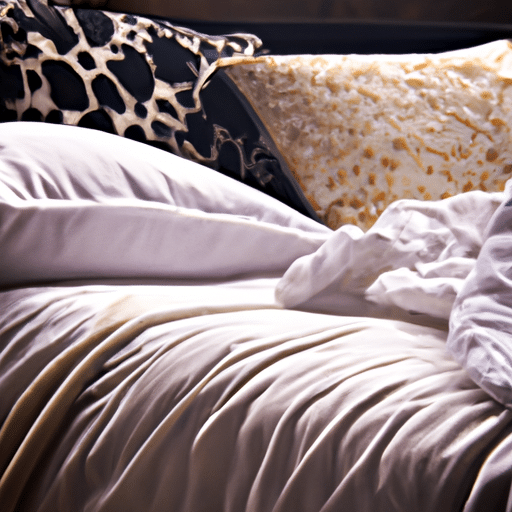You’re not alone if you find yourself tossing and turning at night, struggling to get a good night’s sleep. Many of us have experienced the frustration of restless nights and groggy mornings.
But fear not, for there are simple changes you can make to transform your bedroom into a sleep sanctuary. From choosing the right mattress and adjusting the lighting to incorporating calming scents and decluttering, we’ll guide you through the steps to create the ideal sleep haven that will have you drifting off into dreamland in no time.
Sleep is crucial for our overall health and well-being, and creating an ideal sleep environment in our bedroom is essential for a restful night’s sleep.
We all have different preferences regarding our sleep environment, but some universal tips can help improve the quality of our sleep. In this article, we will explore various factors contributing to a sleep-friendly bedroom and provide tips on optimizing them.
Review contents
Lighting
Use blackout curtains or blinds.
One of the most important aspects of a sleep-friendly bedroom is controlling the light that enters the room. Consider using blackout curtains or blinds to create a dark and peaceful environment. These curtains block out external light sources like streetlights or early morning sunlight, allowing you to sleep undisturbed.
Install dimmer switches
Having the ability to adjust the lighting levels in your bedroom can significantly impact your sleep quality. Installing dimmer switches allows you to control the brightness of your lights, creating a more relaxed and soothing atmosphere as you wind down for the night. Dim lighting signals to your brain that it is time to rest, making it easier to fall asleep.
Avoid bright screens before bed.
The blue light emitted by electronic devices like smartphones, tablets, and laptops can interfere with your sleep-wake cycle and make it more difficult to fall asleep. Avoid using bright screens at least an hour before bedtime. Instead, opt for activities that promote relaxation, such as reading a book or practicing mindfulness techniques.
Temperature
Keep the room cool and well-ventilated
Maintaining a relaxed and comfortable temperature in your bedroom can significantly improve your sleep. The ideal sleeping temperature varies for each individual, but most experts recommend keeping the room between 60-67 degrees Fahrenheit (15-19 degrees Celsius). Investing in a programmable thermostat can help regulate the temperature throughout the night and create a conducive environment for better sleep.
Invest in breathable and comfortable bedding.
Choosing suitable bedding materials is crucial for keeping cool during sleep. Opt for breathable fabrics like cotton or bamboo, which allow for better airflow and prevent overheating. Investing in a mattress and pillows with good ventilation and moisture-wicking properties can help regulate body temperature, keeping you comfortable throughout the night.
Use a fan or air conditioner if needed.
If the temperature in your bedroom tends to get too warm, consider using a fan or air conditioner to create a more pleasant sleeping environment. These devices can help circulate cool air and maintain a comfortable temperature, ensuring a restful night’s sleep.
Noise
Block external sounds with earplugs or a white noise machine
External noises such as traffic, neighbors, or snoring can disrupt sleep. To minimize these disturbances, try using earplugs or a white noise machine. Earplugs help to block out unwanted sounds and create a quiet and peaceful atmosphere. Alternatively, a white noise machine produces a consistent and soothing sound that can drown out background noises, allowing you to sleep undisturbed.
Close windows and use soundproofing measures
If you live in a noisy area or near a busy street, closing your windows can help reduce the amount of external noise that enters your bedroom. Additionally, consider using soundproofing measures such as weather-stripping or acoustic panels to minimize noise disturbances further.
Choose a quiet location for your bedroom.
When selecting a bedroom within your home, consider the location and proximity to noise sources. Position your bedroom away from high-traffic areas or rooms with loud appliances. Choosing a quiet location within your home can contribute to peaceful and uninterrupted sleep.
Bed and Mattress
Select a comfortable and supportive mattress.
The quality of your mattress plays a vital role in ensuring a good night’s sleep. Selecting a mattress that provides both comfort and support for your body is essential. Different individuals have different preferences, so it is essential to test out mattresses and find the right level of firmness that suits your needs. Investing in a high-quality mattress can significantly improve your sleep quality and overall well-being.
Choose a suitable pillow.
A comfortable pillow that supports your head and neck alignment is essential for a restful sleep experience. Pillows come in different materials and thicknesses, so finding the right one for you may require trial and error. Consider factors such as your sleeping position and any specific neck or back concerns when choosing a pillow that suits your needs.
Keep your bed clean and fresh.
Maintaining a clean and fresh bed can contribute to better sleep hygiene. Regularly washing your bed sheets, pillowcases, and mattress covers can help eliminate allergens and keep your sleep environment free from dust mites. Airing out your mattress and rotating it periodically can help maintain its longevity and comfort.
Bedroom Layout
Declutter and organize your bedroom.
A cluttered and disorganized bedroom can create a sense of chaos and stress, making it difficult to relax and unwind. To create a sleep-friendly environment, take the time to declutter and organize your bedroom. Remove any unnecessary items and create designated storage spaces to promote a sense of calm and tranquility.
Position your bed in a suitable location.
The placement of your bed can impact the quality of your sleep. Position your bed away from windows, doors, and areas with high foot traffic to minimize disturbances. Finding a suitable location that feels comfortable and promotes a sense of security can help enhance your sleep experience.
Create a relaxing and calming atmosphere.
The overall atmosphere of your bedroom greatly influences your ability to fall asleep and stay asleep. Create a relaxing and calming environment by incorporating soft lighting, comforting scents, and soothing decor. Consider adding a plush rug, cozy blankets, and gentle artwork to create a space that promotes relaxation and tranquility.
Color Scheme
Opt for soothing and neutral colors.
The colors we surround ourselves with can impact our mood and emotions, making choosing a calming color scheme for your bedroom essential. Opt for soothing and neutral colors like soft blues, light greens, or gentle earth tones. These colors promote relaxation and tranquility, creating an environment conducive to sleep.
Avoid stimulating and vibrant hues.
While vibrant colors can be energetic and visually appealing, they are not ideal for a sleep-friendly bedroom. Avoid stimulating colors like bright reds or bold oranges, as they can create an energetic and distracting atmosphere that may interfere with sleep.
Incorporate calming elements into your decor.
In addition to choosing a soothing color scheme, incorporating calming elements in your decor can further enhance your sleep environment. Add elements such as potted plants, nature-inspired artwork, or calming water features to create a sense of serenity and promote relaxation.
Technology and Electronics
Remove or minimize electronic devices in the bedroom
Electronic devices emit blue light that can interfere with our natural sleep-wake cycle. To create a sleep-friendly bedroom, removing or minimizing electronic devices such as televisions, computers, or smartphones is best. Keep these devices separate or establish a technology-free zone in your bedroom.
Create a technology-free zone.
Designating your bedroom as a technology-free zone can help create boundaries and promote better sleep habits. By keeping electronic devices out of the bedroom, you can minimize distractions and create a space dedicated to rest.
Turn off or silence notifications.
If it is impossible to remove all electronic devices from your bedroom, ensure that notifications are turned off or silenced during sleep hours. The constant pinging or buzzing of notifications can disrupt your sleep and make it difficult to relax and fall asleep.
Aromatherapy
Use lavender or other soothing scents.
Aromatherapy can be a powerful tool for creating a sleep-friendly environment. Lavender, in particular, has been shown to promote relaxation and improve sleep quality. Consider using lavender-scented candles, essential oils, or sachets in your bedroom to enhance your sleep environment.
Consider using essential oils or a diffuser.
Essential oils like lavender, chamomile, and valerian root can have a calming effect on the mind and body, making them ideal for promoting restful sleep. Use a diffuser to disperse the essential oils throughout your bedroom, creating a soothing and fragrant atmosphere.
Experiment with different aromas to find what works best for you
Everyone’s preferences for scents can vary, so it is essential to experiment and find what works best for you. Some individuals may find citrus scents invigorating, while others may prefer the calming effects of floral or herbal aromas. Try out different scents and pay attention to how they make you feel to find the perfect aroma for your sleep environment.
Nighttime Routine
Establish a consistent bedtime routine.
A consistent bedtime routine signals your body that it is time to wind down and prepare for sleep. Establish a routine that includes relaxing activities such as taking a warm bath, practicing yoga or gentle stretching, or reading a book. Consistency is critical, so stick to your routine on weekends or during travel.
Practice relaxation techniques before sleep.
Incorporating relaxation techniques into your nighttime routine can help calm your mind and prepare your body for sleep. Try deep breathing exercises, progressive muscle relaxation, or meditation to relax your body and mind before bed. These techniques can help reduce stress and promote a peaceful transition into sleep.
Avoid caffeine and heavy meals close to bedtime.
To ensure a restful sleep, avoiding consuming caffeine or heavy meals close to bedtime is essential. Caffeine is a stimulant that can interfere with your ability to fall asleep, so it is best to avoid coffee, tea, or caffeinated beverages in the evening. Heavy or spicy meals can also cause discomfort and digestive issues that may disrupt your sleep. Opt for lighter meals in the evening to promote better sleep.
Sleep-friendly Accessories
Try a weighted blanket for improved sleep.
Weighted blankets have gained popularity for their ability to promote relaxation and reduce anxiety. The gentle pressure exerted by a weighted blanket can increase feelings of security and comfort, leading to improved sleep quality. Experiment with different weights to find the most comfortable for you.
Use sleep masks or eye shades to block out light.
For individuals who have difficulty sleeping in a bright environment, sleep masks or eye shades can be a helpful solution. These accessories block light and create a dark and serene atmosphere, allowing for a deeper and more restful sleep.
Consider a white noise machine or sleep-inducing sounds
White noise machines or sleep-inducing sounds can help drown out background noise and create a soothing acoustic environment.
The continuous sound produced by these machines can mask disruptive noises, making it easier to fall and stay asleep. Experiment with different sounds, such as ocean waves or rainfall, to find the most relaxing and sleep-inducing option.
In conclusion, creating an ideal sleep environment in our bedroom is crucial for a restful and rejuvenating night’s sleep. By optimizing factors such as lighting, temperature, noise levels, bed and mattress comfort, bedroom layout, color scheme, technology use, aromatherapy, nighttime routine, and sleep-friendly accessories, we can set the stage for a peaceful and uninterrupted sleep experience.
Everyone’s preferences and needs are unique, so it may require some experimentation and personalization to find the combination of elements that work best for you. With a sleep-friendly bedroom, we can enhance the quality of our sleep and wake up feeling refreshed and revitalized each day.



























